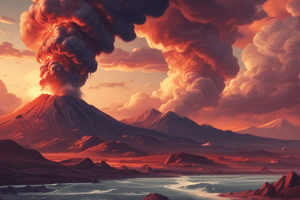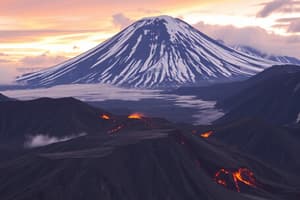Podcast
Questions and Answers
Volcanoes are formed when ______ from within the Earth’s upper mantle works its way to the surface.
Volcanoes are formed when ______ from within the Earth’s upper mantle works its way to the surface.
magma
An erupting volcano can trigger tsunamis, flash floods, earthquakes, ______, and rockfalls.
An erupting volcano can trigger tsunamis, flash floods, earthquakes, ______, and rockfalls.
mudflows
Volcano eruptions have been known to knock down entire ______.
Volcano eruptions have been known to knock down entire ______.
forests
When pressure builds up, ______ occur.
When pressure builds up, ______ occur.
Scientists have categorized volcanoes into three main categories: ______, dormant, and extinct.
Scientists have categorized volcanoes into three main categories: ______, dormant, and extinct.
Flashcards are hidden until you start studying
Study Notes
What is a Volcano
- A volcano is a mountain that opens downward to a pool of molten rock below the Earth's surface.
Characteristics of Volcano Eruptions
- Pressure buildup in a volcano can lead to eruptions, causing gases and rock to shoot up through the opening.
- Eruptions can result in lateral blasts, lava flows, hot ash flows, mudslides, avalanches, falling ash, and floods.
- Volcano eruptions can even knock down entire forests.
Consequences of Volcano Eruptions
- Erupting volcanoes can trigger tsunamis, flash floods, earthquakes, mudflows, and rockfalls.
Formation of Volcanoes
- Volcanoes are formed when magma from the Earth's upper mantle rises to the surface, erupting to form lava flows and ash deposits.
- Over time, a volcano will grow in size as it continues to erupt.
Stages of Volcanoes
- Scientists categorize volcanoes into three main categories: active, dormant, and extinct.
- Note: The characteristics of each category are not specified in the provided text.
Studying That Suits You
Use AI to generate personalized quizzes and flashcards to suit your learning preferences.




